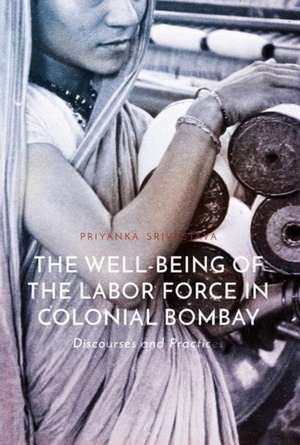The Well-Being of the Labor Force in Colonial Bombay: Discourses and Practices
Autor Priyanka Srivastavaen Limba Engleză Hardback – 28 dec 2017
| Toate formatele și edițiile | Preț | Express |
|---|---|---|
| Paperback (1) | 638.43 lei 6-8 săpt. | |
| Springer International Publishing – sep 2018 | 638.43 lei 6-8 săpt. | |
| Hardback (1) | 643.84 lei 6-8 săpt. | |
| Springer International Publishing – 28 dec 2017 | 643.84 lei 6-8 săpt. |
Preț: 643.84 lei
Preț vechi: 757.46 lei
-15% Nou
Puncte Express: 966
Preț estimativ în valută:
123.24€ • 133.91$ • 103.59£
123.24€ • 133.91$ • 103.59£
Carte tipărită la comandă
Livrare economică 21 aprilie-05 mai
Preluare comenzi: 021 569.72.76
Specificații
ISBN-13: 9783319661636
ISBN-10: 3319661639
Pagini: 271
Ilustrații: XVII, 283 p. 5 illus.
Dimensiuni: 148 x 210 mm
Greutate: 0.51 kg
Ediția:1st ed. 2018
Editura: Springer International Publishing
Colecția Palgrave Macmillan
Locul publicării:Cham, Switzerland
ISBN-10: 3319661639
Pagini: 271
Ilustrații: XVII, 283 p. 5 illus.
Dimensiuni: 148 x 210 mm
Greutate: 0.51 kg
Ediția:1st ed. 2018
Editura: Springer International Publishing
Colecția Palgrave Macmillan
Locul publicării:Cham, Switzerland
Cuprins
1. Introduction.- 2. The Political Economy of the Textile Industry and Its Labor.- 3. Industrial Housing and Sanitation Policies.- 4. Social Service, The Civic Ethic, and Labor Welfare.- 5. Welfare Rhetoric and Maternal Bodies: Protective Legislation Debates in Colonial Bombay.- 6. Childbirth, Childcare, and Women Millworkers.- 7. Epilogue.
Notă biografică
Priyanka Srivastava is Assistant Professor of History and Economics at the University of Massachusetts Amherst, USA.
Textul de pe ultima copertă
This study draws on extensive archival research to explore the social history of industrial labor in colonial India through the lens of well-being. Focusing on the cotton millworkers in Bombay in the late nineteenth and early twentieth centuries, the book moves beyond trade union politics and examines the complex ways in which the broader colonial society considered the subject of worker well-being. As the author shows, worker well-being projects unfolded in the contexts of British Empire, Indian nationalism, extraordinary infant mortality, epidemic diseases, and uneven urban development. Srivastava emphasizes that worker well-being discourses and practices strove to reallocate resources and enhance the productive and reproductive capacities of the nation’s labor power. She demonstrates how the built urban environment, colonial local governance, public health policies, and deeply gendered local and transnational voluntary reform programs affected worker wellbeing practices and shaped working class lives.
Caracteristici
First full-length analysis of the social history of urbanized labor through the lens of well-being/ill-being Brings together scattered threads of labor, urban, gender, nationalist, medical, and social reform histories Examines the gendered nature of well-being practices and complicates the prevalent image of industrial workers as a gender-neutral mass Includes supplementary material: sn.pub/extras
